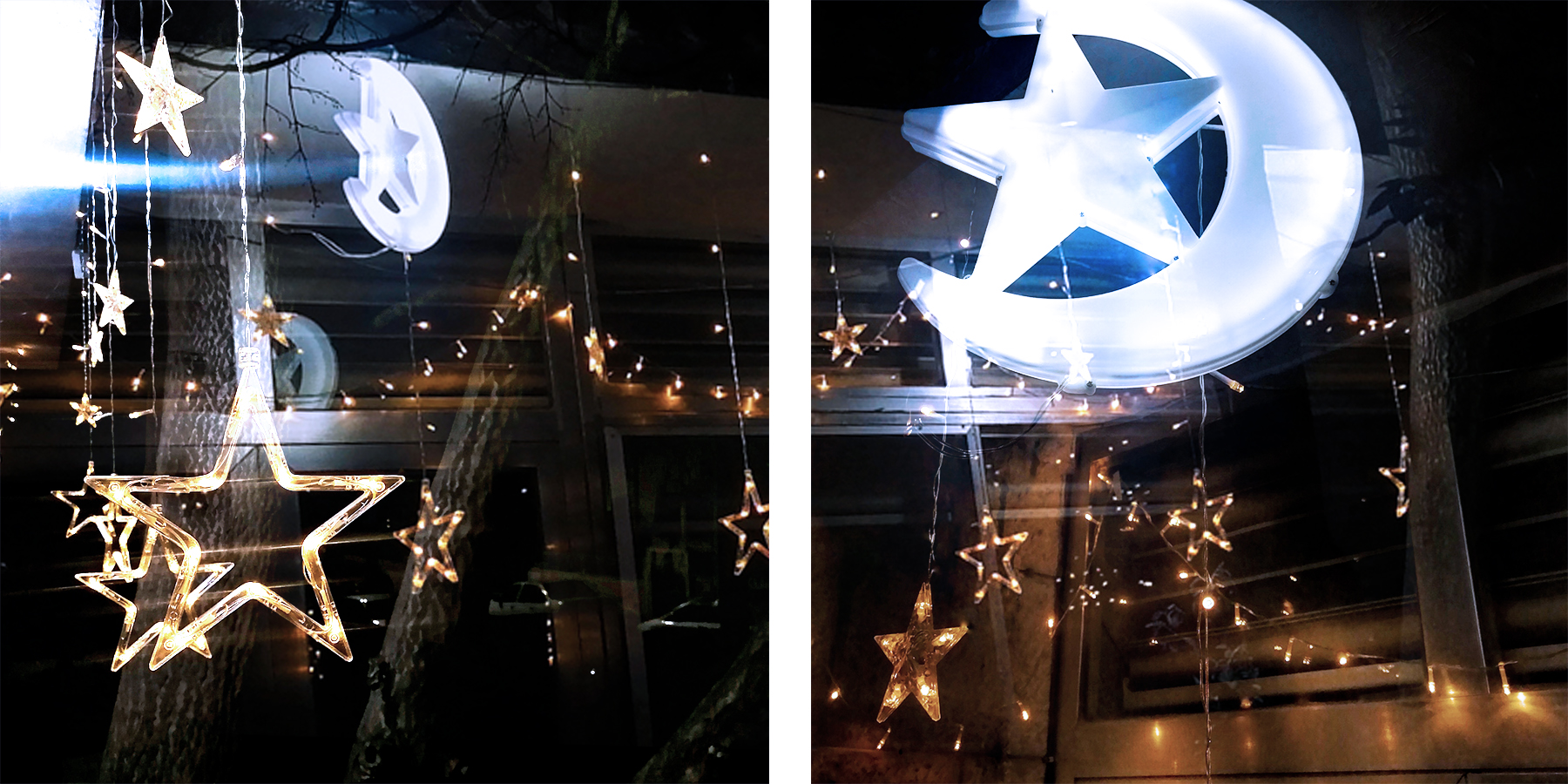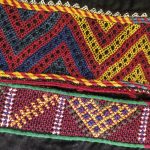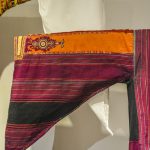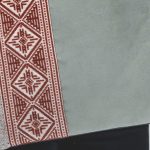During Ramadan, Muslims enjoy decorating their homes with lights in the shapes of stars and crescent moons.
STORY AND PHOTOS BY BATOOL AL-DULIGAN
Ramadan’s vibe in Jordan brings streets full of twinkling lights and colorful lantern decorations; tents pitched especially for nighttime gatherings; children playing in their neighborhoods and celebrating with fireworks; traffic jams; overcrowding in restaurants and bakeries before the call to maghrib prayer at sunset; and people rushing home to break the fast and enjoy the iftar before setting off again to the streets.
For the 30 days of Ramadan, Muslims worldwide fast from food and drink during daylight hours. In Jordan, after breaking their fast with a sunset meal called an iftar, some people go to the mosques for a special prayer called tarawih, others move to the crowded shops, and some enjoy their Ramadan nights at restaurants or in “Ramadan tents” holding unique shows and events with singers and competitions till dawn. Those who prefer to go to the shops after the iftar enjoy the holiday atmosphere, with men in the streets selling juice and qatayef, an Arab dessert commonly served during Ramadan.
But when the coronavirus came to Jordan, everything changed. In 2020, Ramadan, which began on April 24, was depressing, lacking its usual atmosphere. People spent the month in their homes, except for doing their errands from 8 a.m. to 6 p.m., though a week into Ramadan, citizens were allowed to drive for the first time since the beginning of lockdown on March 17. In the last days of Ramadan 2020, people missed their tradition of going to the shops to buy clothes and cookies for Eid al-Fitr, the three-day holiday that follows the 30-day fast.
Things haven’t gotten much better for Ramadan 2021. At the time of this writing, in late April, the coronavirus is still preventing people from practicing their usual habits, with complete lockdowns on Fridays and daily curfews from 7 p.m. to 6 a.m. “The day in Ramadan usually starts after the iftar when people can eat, drink, and enjoy their times,” says Afnan Mwafaq, a Jordanian-Palestinian second-grade English teacher living in Amman. “Now, during the pandemic, we cannot do anything after the iftar because of the lockdown, and this negatively affects our psychology.”
Mwafaq says that COVID-19 restrictions, which prevent people from gathering or inviting others to their homes, have changed the way Ramadan looks in Jordan. “Family and relatives gathering is one of the most important things that we have missed in Ramadan during the corona pandemic,” she says. Moreover, Mwafaq describes how the pandemic has affected the spiritual atmosphere of Ramadan, noting that practice of the tarawih prayer is more fervent in mosques than in homes. She is praying for a reopening of the mosques in the evenings as soon as possible.
In Jordan, Muslims await this holy month on pins and needles, longing to be close to Allah and feel the meaning of spirituality. Every Ramadan night, tarawih, the ritual prayer mentioned by Mwafaq, is performed by Muslims after the isha, or nighttime, prayer. Tarawih usually includes eight, ten, or twenty raka’at and lasts over an hour. (One raka’a is a set of prescribed movements and prayers.) People, whether young or old, men or women, seek to do this prayer every night, requesting closeness to Allah.
Fatima Al-Malah, a Jordanian seventh-grade English teacher living in Amman, remembers the pre-pandemic scene of people walking in the streets together as they came back from the tarawih prayer. She was fond of the huge number of people that went to the mosques and how they managed to practice this prayer during the whole month. “It was nice to see them talking and communicating with each other after finishing the prayer as if they had known each other for a long time,” she says.
In spite of the challenges that come with fasting on top of COVID-19 restrictions, Al-Malah has noticed how people were excited for Ramadan this year. “The positive side from Ramadan during corona is that people are impatiently waiting for this holy month as if it is something that will save them from the hardness of life in light of corona,” she says. “People are waiting for something new to happen with them to break routine. I felt that the coming of Ramadan would compensate people and bring them closer to Allah so they don’t feel alone.”
COVID-19 has changed the lifestyle of everyone in this world, and it is too hard to guess whether people will get back to their Ramadan nights after the pandemic ends and whether they will gather with their relatives as usual. It seems likely, though, that it will take people time to readjust to normal life. Two years of restrictions during Ramadan forced people living in Jordan to change their behaviors, psychology, and mentality. They will need time to heal after the coronavirus threat ends.

Qatayef, a popular Ramadan dessert in the Arab world, are pancake-like wrappers stuffed with a variety of fillings. These qatayef are filled with cream and pistachios.
يوصف مشهد هذا الشهر في الأردن على النحو البسيط التالي؛ زينة تملأ الشوارع والأزقة، وأطفال يلعبون حتى صلاة الفجر في الشوارع احتفالا بالشهر الفضيل. ولا ننسى الشوارع المزدحمة المليئة بالسيارات والناس يتهافتون على المطاعم والمخابز حتى يلحقون في آذان المغرب، حتى يفطروا ومن ثم ينطلقون إلى الشوارع مجددا لإكمال يومهم؛ فقسم ينطلق حتى يصلي العشاء ويقيم صلاة التراويح ويحيي الليل، وقسم آخر ينطلق إلى الأسواق المقتظة، وقسم آخر يكمل سهرته في المطاعم ليعيش الأجواء الرمضانية المليئة بالاحتفالات.
يعيشون الناس في الوطن العربي وفي الأردن تحديدا أجواءً رمضانية مختلفة، فينتظرون الناس هذا الشهر الفضيل على أحر من الجمر حتى يقيموا فيه شعائر الإسلام في المساجد على أكمل وجه، فتقام صلاة التراويح كل ليلة في المساجد على مدار 30 يوم، ويتراوح عدد الركعات من ثمانية إلى عشرين ركعة. حيث، تنعم المساجد بعدد هائل من المصلين خصوصا في صلاة التراويح فتمتلئ المساجد بالشباب والنساء والكبار والصغار، كلهم طالبين القرب من الله عز وجل في الدعاء والصلاة في بيته الكريم.
ولا يقتصر شهر رمضان فقط على العبادات، وإنما يغتنموا الناس الفرصة أيضا ليقضوا سهراتهم في الخيم الرمضانية وفي المطاعم التي تقيم الاحتفالات حتى الفجر.
بالإضافة إلى أن بعض الناس يفضلون الذهاب للأسواق بعد الإفطار بسبب الأجواء الجميلة التي تعم المكان والتي تعطي طابع رمضاني مميز ومختلف عن المعتاد، حيث أن البائعين ينتشرون في الشوارع يبيعون العصائر والحلويات الرمضانية الشهيرة والمميزة.
ولكن، عندما هبت علينا جائحة كورونا اختلفت كل هذه العادات وكل هذه المراسم. ففي عام 2020 كانت أول سنة لكورونا في ظل شهر رمضان المبارك، حيث أمضى الناس شهرهم معتكفين في منازلهم، حيث سمح للناس أن يقضوا حوائجهم من الساعة الثامنة صباحا حتى السادسة مساءً فقط، وفي الأسابيع الأولى من رمضان سمح للناس بالتنقل بسياراتهم لأول مرة منذ السابع عشر من مارس.
لم يشعر الناس بأجواء رمضان ونفحاته إطلاقا، حتى أجواء العيد المعتادة في الأيام الآخيرة من رمضان تأثرت، حيث كان الناس ينطلقون لشراء حاجياتهم لعيد الفطر من ملابس وكعك العيد والكثير من الأمور في آخر ثلاثة أيام من الشهر الفضيل، إلا أن كورونا أصرت بأن تحرم الناس من فرحتهم، فلم يستطع الشعب الأردني من عيش هذه الأجواء المميزة التي تأتي علينا في كل سنة.
وها هو رمضان الآن في سنة 2021 قد هلّ في نفس الموقف والوضع الوبائي الذي عهده الشعب الأردني السنة الماضية. لم ترجع الحياة كما كانت سابقا على الرغم من بعض الانفتاحات التي حصلت، إذ يسمح للجميع بالتنقل والعمل حتى الساعة السابعة مساءً، أما ما بعدها، فيمنع الخروج إلى الشوارع إطلاقا لممارسة أي من الطقوس القديمة سواء أكانت دينية أو حياتية.
ومن خلال مقابلات أجريت مع بعض المواطنين في الأردن، قالت أفنان موفق، معلمة لغة انجليزية -اردنية\ فلسطينية- تقطن في عمان، “يبدأ يومنا الطبيعي في رمضان بعد الإفطار حيث نكون قد أكلنا وشربنا، وننتظر الوقت فقط لنستمتع به، ولكن الآن في ظل أزمة كورونا لا نستطيع عمل أي شيء بعد الإفطار سوى المكوث في المنزل بسبب الحظر الجزئي الذي أثر على صحتنا النفسي بطريقة سلبية.”
وأضافت قائلة،” إن ما نشتاق إليه بشدة في ضوء أزمة كورونا هو جمعة العائلة والأقارب في عزائم رمضانية مميزة لأن من العواقب التي فرضتها كورونا هي عدم عمل التجمعات أو الولائم في المطاعم أو المنازل.”
وأردفت قائلة بأن صلاة التراويح تكون روحانية أكثر بالمسجد منها في المنازل، وأنها تدعو الله ليلا ونهارا بأن تعود الحياة لطبيعتها وتعود الصلاة في المساجد قريبا قبل انتهاء رمضان.
أما فاطمة الملاح، وهي معلمة لغة انجليزية تعيش في عمان-الأردن، قالت،” أرى الجانب الإيجابي من كورونا في رمضان حيث أن الناس أصبحت تنتظر الشهر الفضيل بفارغ الصبر وكأنه المنقذ الذي سينقذهم من عنف الحياة وقسوتها في ظل كورونا. أصبح الناس ينتظرون شيئًا جديدا ليحدث معهم حتى يكسر الروتين القاتل الذي يعيشونه، فشعرت بأنه جاء رمضان ليعوضهم وليقربهم أكثر من الله حتى لا يشعروا أنهم وحدهم.”
وأسهبت في الحديث قائلة،” لقد كنت في السوق قبل رمضان واستطعت أن أرى السعادة التي تغمر الناس والحماس العنيف بسبب اقتراب الشهر الفضيل، وهذا الحماس كان أكثر بكثير من السنوات الماضية وذلك بسبب حاجتهم الماسة إلى شيء جديد وقريب من الله.”
أما بالنسبة للجانب السلبي من منظورها، هو أنها كانت تحب مشهد الناس وهم يتمشون مع بعضهم البعض بعد الانتهاء من صلاة التراويح، وأنها مغرمة وبشدة بالعدد الهائل الذي يزور المساجد لأداء صلاة التراويح ومنبهرة بقدرتهم على السعي لها طوال الشهر. حيث قالت، ” أنه من الجميل جدا أن ترى الناس يتكلمون مع بعضهم البعض بعد الانتهاء من الصلاة وكأنهم يعرفون بعضهم البعض من مدة طويلة.”
غيرت كورونا ملامح الحياة كاملة، ولكن يبقى السؤال، هل ستبقى هذه الملامح الجديدة هي السائدة حتى بعد كورونا؟ هل ستعود السهرات الرمضانية كما عهدناها سابقا؟ وهل ستعود التجمعات والعزائم كما كانت؟ جميعها اسئلة لا يمكننا توقع أجوبة لها، ولكن من وجهة نظري، لن يتعافى الناس بسهولة من أزمة كورونا وسيحتاجون وقتا كافيا ليتأقلموا مع الحياة بطبيعتها السابقة. عامان من حلول الجائحة كانتا كفيلتان بتغيير الناس لطباعهم وسلوكياتهم وعقليتهم. لذلك؛ علينا أن لا نزيد من سقف توقعاتنا تجاههم خصوصا في فترة التعافي مجهولة الموعد، ولكن عاجلا أم آجلا سيتعافى الناس، وستزول الجائحة، وستتغير الحياة للأفضل، بإذن الله.
Batool Al-Duligan is an Arab writer living in Amman, Jordan. She received her Bachelor of Arts degree in Applied English-Linguistics from the University of Jordan and her training in translating news articles at the Jordan News Agency in Amman. She is an opinion writer and columnist at Sasa Post and a marketer at Souq Fann, an e-commerce website and social enterprise that supports the local community and offers new opportunities for craftsmanship in Jordan.




